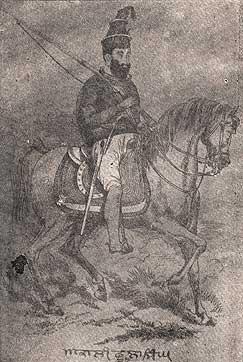Akali Phula Singh: Difference between revisions
No edit summary |
No edit summary |
||
| Line 1: | Line 1: | ||
[[Image:Akali_Phula_Singh_1.JPG ]] | [[Image:Akali_Phula_Singh_1.JPG ]] | ||
=== A very old painting of AKALI PHULA SINGH printed in 1923 ( Courtsey SIKH-NET) === | |||
Akali Phula Singh was born in 1 761 in the village Shinh in Bangar area, in the present day district of Sangroor. His father, Sardar Ishar Singh of Nishanwala Misal, was seriously wounded in the Great Holocaust in 1762, and died shortly thereafter. Akali Phula Singh was deeply religious from early child-hood. He joined an order of Nihangs, also described as Akalis, the immortals, at an early age and became the leader of this devout band of reckless fighters. Akali Phula Singh did not marry. He settled down in Amritsar, where a [[burj]] (tower) and a dayra called Nihangan di chhaoni still stands in his memory. He had dedicated his life to the care of Sikh shrines and loved to serve people in accordance with the Guru's message. | |||
In 1802, in response to the request of the leading citizens of Amritsar, and to make Amritsar part of his domain, Maharaja Ranjit Singh laid siege to the city. The city was in the hands of Bhangi Misal chiefs. Both the forces faced each other and were ready to shed blood. Akali Phula Singh was dis-tressed to find Sikh forces engaged in fighting among themselves. After consulting the respectable citizens, he marched out along with them and stood between the opposing forces. He succeeded in persuading them to stop fighting. The Bhangi Sardars surrendered one by one, and the fort of Amritsar passed into the Maharaja's hands. | |||
At the request of the Maharaja, Phula Singh joined his army along with 3,000 Nihangs. They were well known for their daredevil courage and their freedom in speaking their mind. Akali Phula Singh was a fierce and selfless warrior. He participated in many battles, and every time, distinguished himself by his outstanding courage and fearlessness against the heaviest odds, as at Kasur, Multan, and Naushera. Ranjit Singh owed many victories to the glorious valour of the Nihangs. | |||
Phula Singh died fighting near Naushera in 1823, where, across the river Kabul, his memorial still stands as a witness to his undying chivalry. | |||
== EXTERNAL LINK == | == EXTERNAL LINK == | ||
http://sikh-heritage.co.uk/warriors/Phula%20Singh/Akali%20Phula.htm | http://sikh-heritage.co.uk/warriors/Phula%20Singh/Akali%20Phula.htm | ||
[[Category:Great Sikh Warriors]] | [[Category:Great Sikh Warriors]] | ||
Revision as of 22:54, 3 July 2006
A very old painting of AKALI PHULA SINGH printed in 1923 ( Courtsey SIKH-NET)
Akali Phula Singh was born in 1 761 in the village Shinh in Bangar area, in the present day district of Sangroor. His father, Sardar Ishar Singh of Nishanwala Misal, was seriously wounded in the Great Holocaust in 1762, and died shortly thereafter. Akali Phula Singh was deeply religious from early child-hood. He joined an order of Nihangs, also described as Akalis, the immortals, at an early age and became the leader of this devout band of reckless fighters. Akali Phula Singh did not marry. He settled down in Amritsar, where a burj (tower) and a dayra called Nihangan di chhaoni still stands in his memory. He had dedicated his life to the care of Sikh shrines and loved to serve people in accordance with the Guru's message. In 1802, in response to the request of the leading citizens of Amritsar, and to make Amritsar part of his domain, Maharaja Ranjit Singh laid siege to the city. The city was in the hands of Bhangi Misal chiefs. Both the forces faced each other and were ready to shed blood. Akali Phula Singh was dis-tressed to find Sikh forces engaged in fighting among themselves. After consulting the respectable citizens, he marched out along with them and stood between the opposing forces. He succeeded in persuading them to stop fighting. The Bhangi Sardars surrendered one by one, and the fort of Amritsar passed into the Maharaja's hands. At the request of the Maharaja, Phula Singh joined his army along with 3,000 Nihangs. They were well known for their daredevil courage and their freedom in speaking their mind. Akali Phula Singh was a fierce and selfless warrior. He participated in many battles, and every time, distinguished himself by his outstanding courage and fearlessness against the heaviest odds, as at Kasur, Multan, and Naushera. Ranjit Singh owed many victories to the glorious valour of the Nihangs. Phula Singh died fighting near Naushera in 1823, where, across the river Kabul, his memorial still stands as a witness to his undying chivalry.
EXTERNAL LINK
http://sikh-heritage.co.uk/warriors/Phula%20Singh/Akali%20Phula.htm

